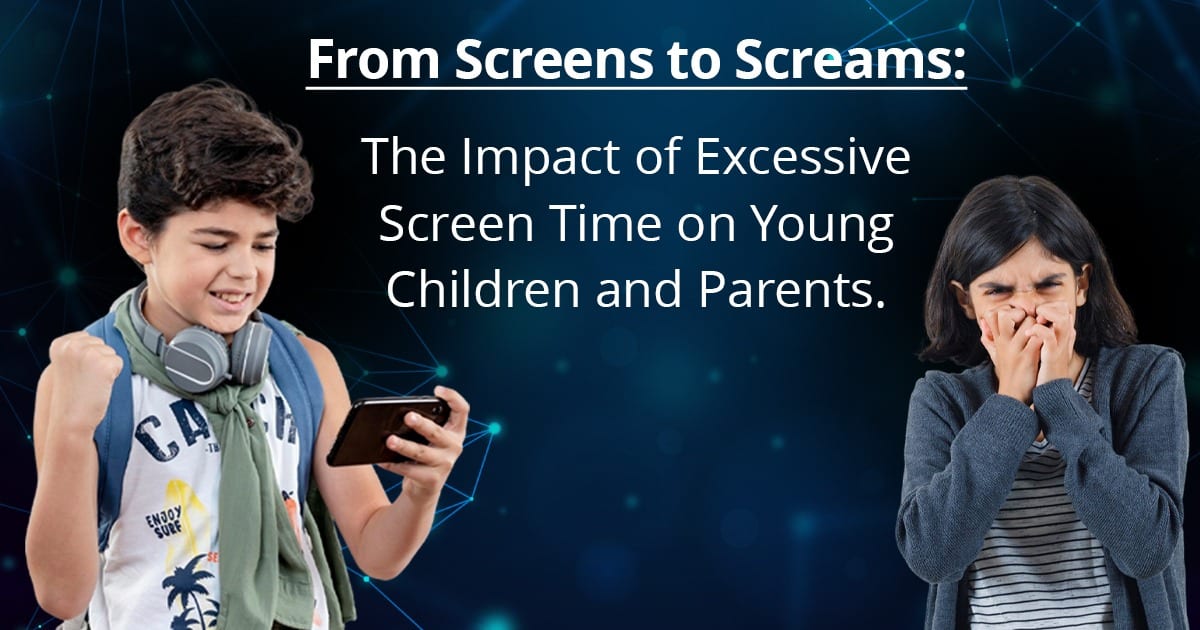The10 Principles of Good Parenting What is parenting? Parenting is the process of promoting and supporting the physical, emotional, social, and intellectual development of a child from infancy to adulthood. Parenting refers to the aspects of raising a child aside from the biological relationship. Being a parent is one of the most fulfilling experiences a person can have. The most important thing a parent can
From Screens to Screams: The Impact of Excessive Screen Time on Young Children and Parents
In the modern era dominated by digital devices, screens have become indispensable, drawing us into a ceaseless flow of information and entertainment. However, prolonged exposure to screens can lead to addiction, triggering stress, anxiety, and tantrums among children and their parents alike. Let us explore the repercussions of excessive screen use and provide practical tips for healthy screen use in young children.
Though screens can be helpful in today’s fast developing world, too much of anything can be very harmful — and screen time is no exception, not only for children but for the adults too. Everyday hundreds of parents are noticing how excessive exposure is affecting their little ones. When parents try to take away the phone, or limit the screen-time, frequent breakdowns, arguments, anger issues are often seen in the child’s behaviour. Shorter attention spans, sleep troubles, and even rising anxiety are becoming too common in every house-holds. And it’s not just about the children who are being the pray of the device — parents, too, often feel overwhelmed, guilty, or helpless, unsure of how to strike the right balance.
Every parent should understand that kids grow fast, their minds are still developing, and they need real-world experiences — not just pixels — to grow. Also they will do exactly what they see their parents to do. Outdoor play, face-to-face conversations, creative activities, and unstructured time are vital for emotional and social development, and in today’s busy world both the parents often get busy in their corporate life which effect the children. They get ignored and start feeling alone, which make them addict to phone and video games.
So what can we do which can help to avoid screen time both for the parents and the children??
Here are a few simple yet effective tips to encourage healthy screen habits at home:
- Create screen-free zones like having at-least two meals together in the dining table and watching a movie together in the living area to encourage more family interaction.
- Setting time limits and a daily time table and being consistent on.
- Lead by example — when parents unplug, kids are more likely to follow, as children often do what they see their elders to do.
- Offer alternatives — books, puzzles, art, or a walk in the park can be just as engaging.
- Watch together — co-viewing turns screen time into a shared activity and gives you a chance to talk about what your child is seeing.
Well, increasing screen time can be very harmful, both for the parents and children, as we discussed before, they can go through severe emotional, health, mental issues which can impact their physical health as well.
Here are some of the problems which are seen regularly in children and their parents:
Impact on children
- Delayed cognitive development – Children develop every day; as they develop, they start exploring. Daily excessive screen time in young children can hinder brain development by reducing opportunities for active exploration and real-life interaction. This may lead to delays in language, attention, and problem-solving skills.
- Social-emotional difficulties – Screen time cuts the relationship of the child with the parents and their social circle, which affects their emotions and social behaviour.
- Increased risk of obesity and sleep problems – As per records, numbers of people, including both children and adults, are facing a high risk of obesity in today’s generation. Several factors, including less physical activity and often snacking on unhealthy & oily foods, result in obesity.
- Decreased attention span and academic performance – Academic performance is one of the most alarming issues which is often faced by the children. They get so indulged in screen time that they get inattentive and unresponsive in school and tuition.
Impact on parents
- Increased stress and anxiety
- Decreased quality time with children
- Negative role modelling
- Decreased productivity and work-life balance
Healthy screen time tips for young children
- age-appropriate limits (e.g., I hour/day for 2-5-year-olds).
- Choose educational and interactive content.
- Co-view with the child and engage in conversations.
- Encourage physical activity and outdoor play.
- Designate screen-free zones (e.g., dinner table, bedrooms).
- Monitor and set boundaries consistently.
- Engage in alternative activities (e.g., reading, drawing, puzzles).
- Prioritise quality time with the child.
- Practise mindful screen use yourself.
- Seek professional help if needed.
You may lessen the possibility of shouts and tantrums by educating the youngster about the possible hazards and establishing good screen-time practices. Remember that in the digital age, parenting contented, healthy, and well-rounded kids requires a balanced approach.

